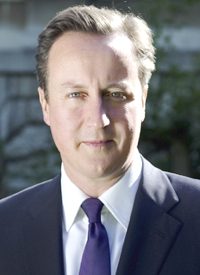
British Prime Minister David Cameron (left) is reportedly considering the drastic step of “pre-crime” blocking of social media sites if the violent riots in his country continue. He contends that such a move would permit authorities more time to “catch up” with arrests of suspects shown rioting on surveillance cameras. The communication platforms under particular scrutiny are Twitter, Facebook, and Blackberry Instant Messenger.
In an address to the British House of Commons on Thursday, Cameron explained:
Free flow of information can be used for good. But it can also be used for ill. So we are working with the Police, the intelligence services and industry to look at whether it would be right to stop people communicating via these websites and services when we know they are plotting violence, disorder and criminality.
Similar measures were taken by then-President Hosni Mubarak during the Egyptian revolution earlier this year. The Guardian reported on the impact of social networking during the conflict:
The Egyptian uprising has been described as a “Twitter Revolution” … The Internet provided a vital organizing tool, and it gave us some of the most riveting real-time coverage ever recorded. The tweets were instant, and so emotional and exciting that anyone following them felt an intense personal connection to what had been happening across Egypt since 25 January.
It’s for that reason that Mubarak shut down Twitter in his last-ditch effort to retain power.
However, as noted by The Blaze, this is the “first time a major western power has taken the drastic measure.”
Observers say that if Cameron takes such a significant action, it would exacerbate fears that the U.S. government could and would use similar measures in this country. The Blaze explains:
Many U.S. pundits have criticized the British welfare state, and pointed to lax liberal European policies on everything from immigration to crime as reasons for the unrest. Some consider the U.S. is hardly a free market, capitalist utopia — with 45 million Americans on foodstamps, and 50% of our citizens not paying a dime to the federal government in taxes each year. So arguably, many of the factors that are at play for the riots in the U.K., are also at play for those of us across the pond.
Just last week in San Francisco, police resorted to jamming cell phone communications in order to prevent plannned protests there. According to Gawker.com for August 12:
Protesters had planned to gather at a San Francisco BART [Bay Area Rapid Transit] station during rush hour to protest the fatal July shooting of Charles Hill by a BART police officer. But the protest never materialized. One reason, possibly, is the extreme lengths police went to make sure potential protesters couldn’t communicate.
CBS San Francisco continued:
As an added precaution, the agency [BART] shut off cellphone service on the station’s platform. While [police Lieutenant Andy] Alkire said the tactic was an unusual measure, he said it was “a great tool to utilize for this specific purpose” given that the agency was expecting a potentially volatile situation.
Similarly, Congress has been considering an “Internet Kill Switch” bill which would give the President the sole power to shut down the Internet. Known as the Protecting Cyberspace as a National Asset Act, the measure would require private companies such as “broadband providers, search engines, or software firms” to “immediately comply with any emergency measure or action” put in place by the Department of Homeland Security. Those refusing to comply would face harsh penalties. The bill would also create the National Center for Cybersecurity and Communications, under which any private company reliant on “the Internet, the telephone system, or any other component of the U.S. information structure” would be subject to compliance.
Unsurprisingly, the bill faces harsh criticism, as it would essentially create a system for absolute control of U.S. communications. Senator Joseph Lieberman (D-Conn.), who introduced the bill, defended its necessity, claiming that companies may have to “do things in a normal business sense you’d be hesitant to do but national security requires you to do.” He added, “We protect them from that because the action the government is ordering them to take is in national security or economic interest.”
But constitutionalists observe a pithy warning from Ben Franklin about government’s notion that it can justify greater control of its citizens in the name of security: “He who gives up liberty for a little temporary security deserves neither liberty nor security.”




